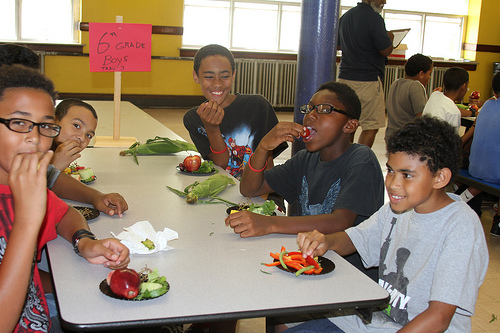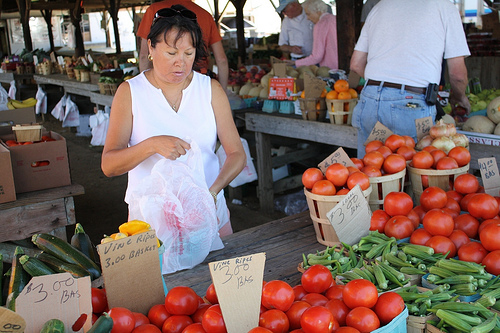An apple for the teacher? Yes, and the cafeteria too.
Classic images of eager children handing perfect apples to their teacher abound. In the idealized imagery, the apples are often shiny, red, and round. And if you are angling for a good grade, or really like your teacher, the apples are big. But in New Hampshire it was “school boy” apples, the small ones 2 – 3 inches in diameter, which launched an impressive farm to school program.
The New Hampshire Farm to School Program (NHFTS) was established in 2003 as a pilot program funded by the USDA’s Sustainable Agriculture Research & Education (SARE) program to introduce local apples and cider into New Hampshire K-12 schools.
“We really saw the small apples as an entry point for our farm to school program. Not many supermarkets or other vendors are interested in the smaller fruit, but they are the perfect size for schools,” said Elisabeth Farrell, Sustainability Program Manager of the Sustainability Institute at the University of New Hampshire. Read more »

On Wednesday, August 29th at 2pm EDT, USDA’s Center for Faith-Based and Neighborhood Partnerships will host the next presentation in its “Together We Can” webinar series to introduce partners to the resources and programs offered by the U.S. Department of Agriculture (USDA). Wednesday’s webinar will focus on resources for building local and regional food systems in your community. Read more »
Pennsylvania is among the country’s top ten states represented in the USDA’s National Farmers Market Directory. I recently completed a trip through the Fruit Belt to the Lehigh Valley and Philadelphia to see how USDA’s support of farmers market development is impacting communities and helping farmers across the Keystone State.
My first stop was Camp Hill, a small town outside Harrisburg, to visit a new farmers market developed with the assistance of community organizations including Capital Resource and Conservation & Development Area Council (Capital RC&D). Capital RC&D received a USDA Farmers Market Promotion Program grant to help farmers markets improve their consumer outreach and receive EBT and debit payments to expand micro-business opportunities for the area’s local farmers. The market, which just opened in May, is off to a great start with over a dozen vendors selling local bread, meat, dairy and produce from Pennsylvania’s fruit belt. Read more »
Tags: Farmers Market, FMPP, Joani Walsh, KYF2, KYF2 Compass, National Farmers Market Directory, Pennsylvania, Philadelphia, SNAP, The Food Trust
 Food and Nutrition, Know Your Farmer, Know Your Food
Food and Nutrition, Know Your Farmer, Know Your Food
USDA’s Food and Nutrition Service (FNS) recently released its 2009-10 School Food Purchase Study, which provides national estimates of the quantity, value and unit price of food acquisitions by school districts participating in the National School Lunch and School Breakfast programs. This year, the Survey for the first time asked specifically if school districts were purchasing local food and included questions about the total value of purchases and the major items purchased.
School district responses provide an important baseline for tracking the national progress of local food purchases by school food service programs. The responses showed that about 2 out of every 10 school districts surveyed purchased local produce for school meals during the 2009-10 school year, based on responses from a nationally representative sample of 416 school district food service directors about practices for purchasing food for school meal programs. An additional 12 percent indicated that they are in the process of developing a program for buying locally grown produce. Read more »

Fruit and Veggie Ambassadors sampling fresh fruit and vegetables at a Pawtucket Summer Food Service Program.
Do you know what a Malanga is? What about a Chocolate Pepper? The “Fruit and Vegetable Ambassador ” (F&V Ambassador) students of Slater Jr. High School in Pawtucket, Rhode Island learned about these unusual vegetables and more during their Summer Food Service Program fruit and vegetable taste testing. For the less adventurous vegetable eater, a Malanga is a root vegetable that has a nutlike flavor and when cut open looks similar to a sweet potato. A Chocolate Pepper is a purple Bell Pepper.
The students at this summer food program are nicknamed the “F&V Ambassadors” of their school. Along with this prestigious title, students get cool t-shirts and, most importantly, the responsibility of encouraging fellow students throughout the school year to make healthier decisions at lunchtime. Read more »

A vendor places tomatoes into a plastic bag for a customer at a Maryland farmers market. Many beginning producers use farmers markets as the gateway to direct marketing opportunities. Photo by Elvert Barnes
This week we’ve celebrated farmers markets as a vibrant segment of U.S. agriculture that offers a unique and personal way to connect producers and consumers. We highlighted decades of farmers market participation, updated the status of farmers markets across the U.S., offered an example of innovation in the lessons learned by a market in Kentucky, and explained how structure and function interact through farmers market architecture. Now, with National Farmers Market Week coming to a close tomorrow, we thought we should share some perspective on how farmers markets fit into the larger local and regional food landscape. Read more »



